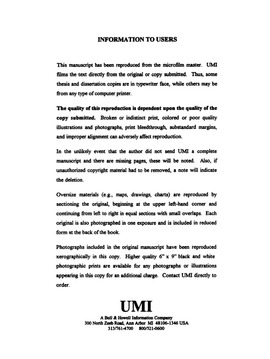| dc.contributor.advisor | Copeland, Gary, | en_US |
| dc.contributor.author | Farmer, Rick D. | en_US |
| dc.date.accessioned | 2013-08-16T12:30:11Z | |
| dc.date.available | 2013-08-16T12:30:11Z | |
| dc.date.issued | 1998 | en_US |
| dc.identifier.uri | https://hdl.handle.net/11244/5693 | |
| dc.description.abstract | The model of legislative reform posited here include internal factors like: members' characteristics, professionalism, and internal political culture. It also include external influences like: the constitution, the states' traditional political culture, the current political environment, and the length of the term limits. | en_US |
| dc.description.abstract | Hypotheses were derived from the general theory that members seek to fulfill their ambitions within the workings of the legislature. Since members control the structure of the legislature, if they are unable to accomplish their goals within the current structure they will "twist it"$\sp1$ until they can. Links between members' motivations and other characteristics with their preferences toward legislative structure are tested, looking for changes that have occurred since term limits were imposed. Using Oklahoma as a case study controlled for the various environmental factors and facilitated the examination of hypotheses related specifically to term limits, membership characteristics, and preferences. | en_US |
| dc.description.abstract | The study brings together several lines of research: state legislatures generally, legislative reform, legislators' motivations, and term limits. Each of these literatures contribute to the development of a theoretical model of legislative reform. The results of this study inform and in some cases challenge the previous work that has been done in these areas of research. | en_US |
| dc.description.abstract | As term limits were sweeping the country in the early 1990's, academics and pundits were speculating about the effects term limits would have on state legislatures. They could do little more than speculate, because most of the effects were still in the distant future. This dissertation is an early attempt to move beyond speculation and address, with empirical data, how legislative institutions are being affected by term limits. | en_US |
| dc.description.abstract | The effects of term limits in Oklahoma will likely arise more from eliminating senior statesmen and replacing them with younger, less experienced members. While these effects are substantively important, in a state with a semi-professional legislature and which has a lengthy limit like Oklahoma the effects are not likely to be as dramatic as predicted by either proponents or opponents. ftn$\sp1$Schlesinger, 1966. | en_US |
| dc.description.abstract | The key findings of this research indicate that partisanship is the most important predictor of formal processes in the legislature, while ambition and gender are better predictors of informal processes. Term limits have few direct effects on members' preferences toward legislative structure. They also have few effects on members' characteristics; a new breed of legislator is not likely to emerge. | en_US |
| dc.description.abstract | To test the hypotheses, motivations were scaled for each member. The results show that members ambitions are a complex set of competing interests not easily captured in two dimensions or reduced to single minded office seeking, as posited elsewhere. | en_US |
| dc.description.abstract | Oklahoma's $46\rm\sp{th}$ Legislature was an excellent laboratory for this study. Approximately 60 percent of the members were first elected before term limits were ever a public issue. The remaining 40 percent were first elected after term limits became a reality. This unique membership combination created two somewhat evenly matched comparison groups, easily accessible for survey research and interview purposes. | en_US |
| dc.format.extent | xi, 227 leaves ; | en_US |
| dc.subject | Political Science, Public Administration. | en_US |
| dc.subject | Oklahoma. Legislature Term of office. | en_US |
| dc.subject | Oklahoma. Legislature. | en_US |
| dc.subject | Political Science, General. | en_US |
| dc.subject | Oklahoma Politics and government 1907- | en_US |
| dc.subject | Term limits (Public office) Oklahoma. | en_US |
| dc.title | Coping with limits: Responding to reform in Oklahoma. | en_US |
| dc.type | Thesis | en_US |
| dc.thesis.degree | Ph.D. | en_US |
| dc.thesis.degreeDiscipline | Department of Political Science | en_US |
| dc.note | Chair: Gary Copeland. | en_US |
| dc.note | Source: Dissertation Abstracts International, Volume: 59-09, Section: A, page: 3625. | en_US |
| ou.identifier | (UMI)AAI9905609 | en_US |
| ou.group | College of Arts and Sciences::Department of Political Science | |
